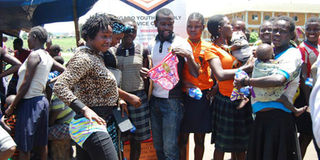Street girls cry out for pads, knickers

Brief. Street women with pads and knickers given by the NGOs in Kampala yesterday. PHOTO BY GILLIAN NANTUME
What you need to know:
- At the activity to commemorate International Women’s Day, the two civil society organisations donated to the women AFRIpad reusable kits and one knicker each.
- The street girls say the money they get is only enough to buy food and not sanitary towels.
Kampala. While civil society organisations are providing sanitary towels to a number of disadvantaged women and girls across the country, few of them have actually taken into account the fact that some of the beneficiaries do not have knickers to hold the pads.
This dilemma was highlighted yesterday during an activity organised by Together Alive Health Initiative (TAHI), and Ngabo Youth Friendly Services Centre in Kikaramoja, Base Zone, Katwe II, in Kampala.
“We use rags (during menstruation) without knickers,” said Sarah Akol, a beggar on Kampala streets, adding: “It is expensive to buy knickers. I know cheap knickers cost Shs500, but I need all the money I get from the streets to buy food.”
To the 19-year-old woman, food is more important than wearing knickers. She added that during her period, if the rags are not enough, she remains indoors for five days and sits on top of a sand-filled hole dug in the floor. The blood flows into the hole.
To the girls and women of Kikaramoja, pregnancy is much easier to handle than menstrual periods because a woman in her period cannot go on the streets to beg. Ms Asha Lakiru, the director for women and children in Karamoja United Family Organisation, said the scarcity of knickers in the community has encouraged criminality.
“Rape cases are rampant because even children as young as eight years are victims. We have 2,650 people in this community and only 150 live in houses. The rest sleep outside in the open,” said Ms Lakiru.
The houses, made from sticks and polythene, accommodate about eight people, regardless of their sex. Each person pays the owner of the house Shs1,000 daily. Of the 500 children in the community, only 69 attend school. The rest are beggars.
At the activity to commemorate International Women’s Day, the two civil society organisations donated to the women AFRIpad reusable kits and one knicker each.
Mr Charles Tumwebaze, the executive director of TAHI, said: “On this Women’s Day, instead of holding meetings in big hotels, we decided to come and celebrate it with the women of the Karamoja community in Kampala. When we first came here, the women told us that if we give them the pads, they will not use them because they do not have the knickers to wear with them.”




